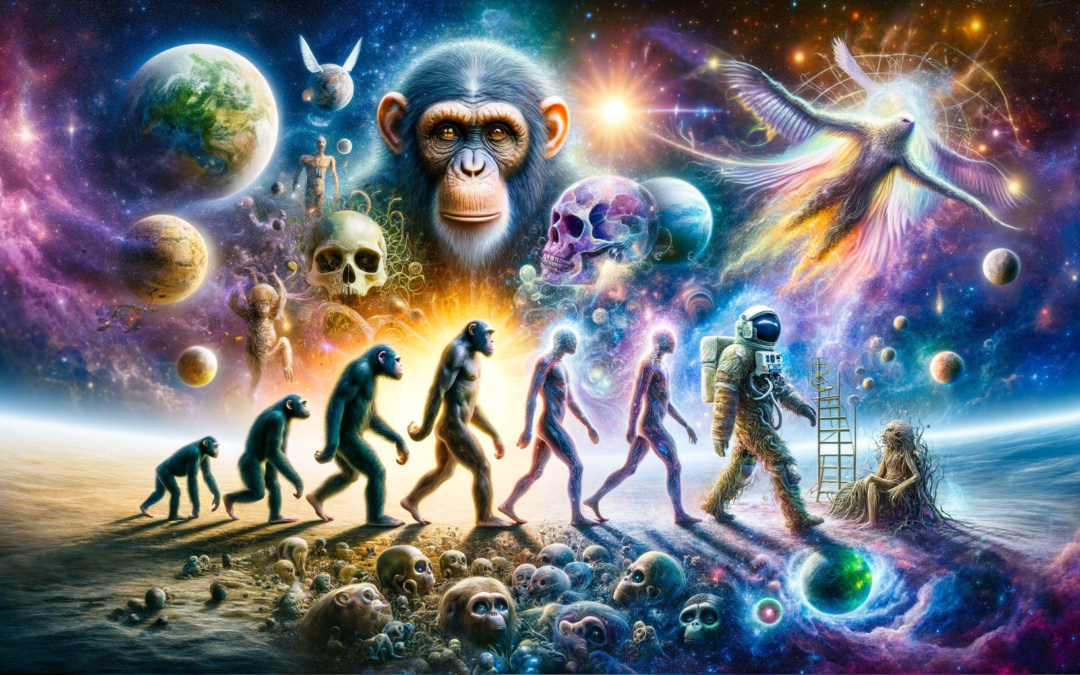The Cosmic Question: Our Place in the Universe
In the grand tapestry of existence, the origins of humanity remain one of its most intricate and compelling patterns. From the heart of our DNA to the farthest reaches of the cosmos, each thread tells a story, a theory, a possibility. Let’s unravel these threads, extending our understanding beyond the familiar narrative of evolution from apes, to explore the rich diversity of theories about our genesis.
The Dominant Melody: Evolution from Apes
Charles Darwin’s revolutionary idea, like a beacon in the dark, illuminated our understanding of life. He proposed that all species, including humans, evolve over time through natural selection. The theory suggests that humans, Homo sapiens, share a common ancestor with modern apes such as chimpanzees and gorillas. This ancestor, neither human nor ape, diverged into distinct lineages, one of which led to us.
Imagine a grand tree of life, its branches representing different species. Our branch and that of chimpanzees shared a common junction, an ancestor, about 5 to 7 million years ago. This story is supported by a trove of fossil evidence. Lucy (Australopithecus afarensis) and the more recent discovery of Homo naledi are like snapshots in our family album, each fossil a testament to our evolutionary journey.
The Alternate Harmonies
While evolution is the prevailing scientific theory, it’s not the only melody in the symphony of human origin theories.
Creationism
Here, the universe is an intentional masterpiece of a divine artist. In this view, humans are not a product of evolutionary processes but are purposefully created. This belief, deeply rooted in numerous religious and spiritual traditions, offers a perspective that intertwines the origin of humanity with the divine. While lacking empirical evidence, it holds profound cultural and spiritual significance for many.
Intelligent Design
Like a bridge between science and spirituality, this theory posits that certain features of the universe and living things are too complex to be explained by natural selection alone. It suggests an intelligent cause. This theory, while controversial in scientific circles, invites a dialogue between the realms of science and belief, exploring the possibility of a purposeful design in the universe.
Panspermia
In this cosmic theory, life is not an Earthly exclusive. Panspermia suggests that life, possibly even the seeds of humanity, originated from the stars and was transported to Earth. This idea, while speculative, expands our quest for origins beyond our planet, entwining our genesis with the mysteries of the cosmos.
Ancient Astronaut Theory
Venturing further into speculative territory, this theory imagines our ancestors gazing up at starry visitors. It suggests that extraterrestrials visited Earth in ancient times and may have influenced human evolution. This theory, more at home in science fiction, captivates the imagination and challenges our understanding of history and our place in the universe.
The Ethical Chords: Weighing Beliefs and Evidence
Discussing these theories requires a symphony of respect and responsibility. Science, grounded in empirical evidence, offers testable explanations. Other theories, rich in cultural and spiritual significance, may not meet empirical standards but are essential parts of the human experience. The challenge lies in harmonizing scientific understanding with respect for diverse beliefs.
The Unending Verse: Our Evolving Understanding
Our understanding of human origins is itself evolving. Every fossil unearthed, every genome sequenced, adds a new note to our story. We are on a journey of discovery, not just of our biological roots but of what it means to be human in the grand scheme of the universe.
Conclusion: Embracing the Mystery
The exploration of human origins, from evolution to divine creation, from cosmic seeding to ancient astronauts, is a reflection of our unquenchable thirst for knowledge. Each theory offers a unique lens to view our genesis, a different story of how we came to be. As we continue to gaze at the stars and delve into our past, we embrace the mystery of our origins, ever seeking answers in the vast and beautiful cosmos.










